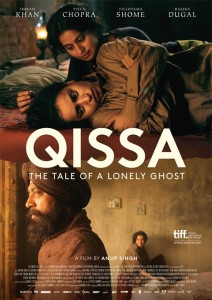Rating: * * *
By: Keyur Seta
Unconventional storyline and narrative aren’t the only prerequisites for a good art-house or off-beat film. It is much more important for the experience to haunt you long after it’s over through its interesting and, sometimes, disturbing questions. Anup Singh’s Qissa: The Tale of a Lonely Ghost manages to do that, which makes it an interesting watch for the niche audience it targets.
The tale commences in 1947 in Pakistan, where Umber Singh (Irrfan Khan) and his wife (Tisca Chopra) are forced to migrate to India after they lose everything in the partition that followed India’s independence. Singh establishes his business in Punjab, India from scratch. But he feels his life is far from satisfactory since he doesn’t have a son.
After giving birth to three daughters, when his wife is pregnant again, Singh reaches new levels of desperation for a male child. But he is bestowed with a girl child yet again. However, due to his obsession for a son, Singh is unable to accept that his newborn child is a female. What will be its consequences after the girl (Tillotama Shome) grows up?
From the initial portions, Qissa (Punjabi film with English subtitles) appears as yet another of those numerous films based on the partition of India and Pakistan. But thankfully, we soon realize that its basic storyline is creative, intriguing, thrilling and, above all, completely out-of-the-box. The later twists in the plot also bring an element of thrill.
Moreover, this highly unusual subject is treated in the simplest of manners, which makes the film rich and intelligent in content. The makers have presented a new aspect of patriarchy through the issue of gender identity crisis without anyone speaking about it and just by using the visual medium; an idea that has been tried a lot these days, especially in regional cinema.
But Qissa has its shares of downfalls. The psyche of Umber Singh and the result of his adamancy over his wife should have been explained more because it is something of extreme proportions. The basic tale also has few errors. The proceedings lose grip in the second half with the narrative becoming too self-indulgent. This point ensures the film will be more acceptable only to the film festival audience. Nevertheless, it does shake you up with its questions and an open ending.
The overall packaging meets international standards, thanks to the work carried out by the technical department. Sebastian Edschmid, the DoP who has worked with a host of international films, has artistically captured the village locales. Music composers Beatrice Thiriet and Manish J Tipu and aided the subject with their compositions. The editing too is rich.
It is compulsory for films of this genre to have quality performances and that is exactly the case with Qissa. Irrfan Khan performs a complex patriarchy-obsessed husband and father with subtle ease. Only an artist of his caliber could have brought alive this character with such realism.
But it is Tillotama Shome who had the most difficult task lined up. Without revealing much about the tale, she is brilliant while playing a character facing gender identity crisis. Rasika Duggal too doesn’t lag behind by providing a high class act in another complicated character. Tisca Chopra too displays her helplessness effectively as Umber Singh’s wife.
Overall: Qissa: The Tale of a Lonely Ghost has enough potential to appeal to its target audience.
Director: Anup Singh
Producers: National Film Development Corporation (NFDC), Heimatfilm, Augustus Film and Cine-Sud Promotion
Writers: Anup Singh and Madhuja Mukherjee
Cast: Irrfan Khan, Tillotama Shome, Rasika Duggal, Tisca Chopra
Music: Beatrice Thiriet and Manish J Tipu
Genre: Period Drama
Release Date: February 20, 2015 (India)

Leave a Reply